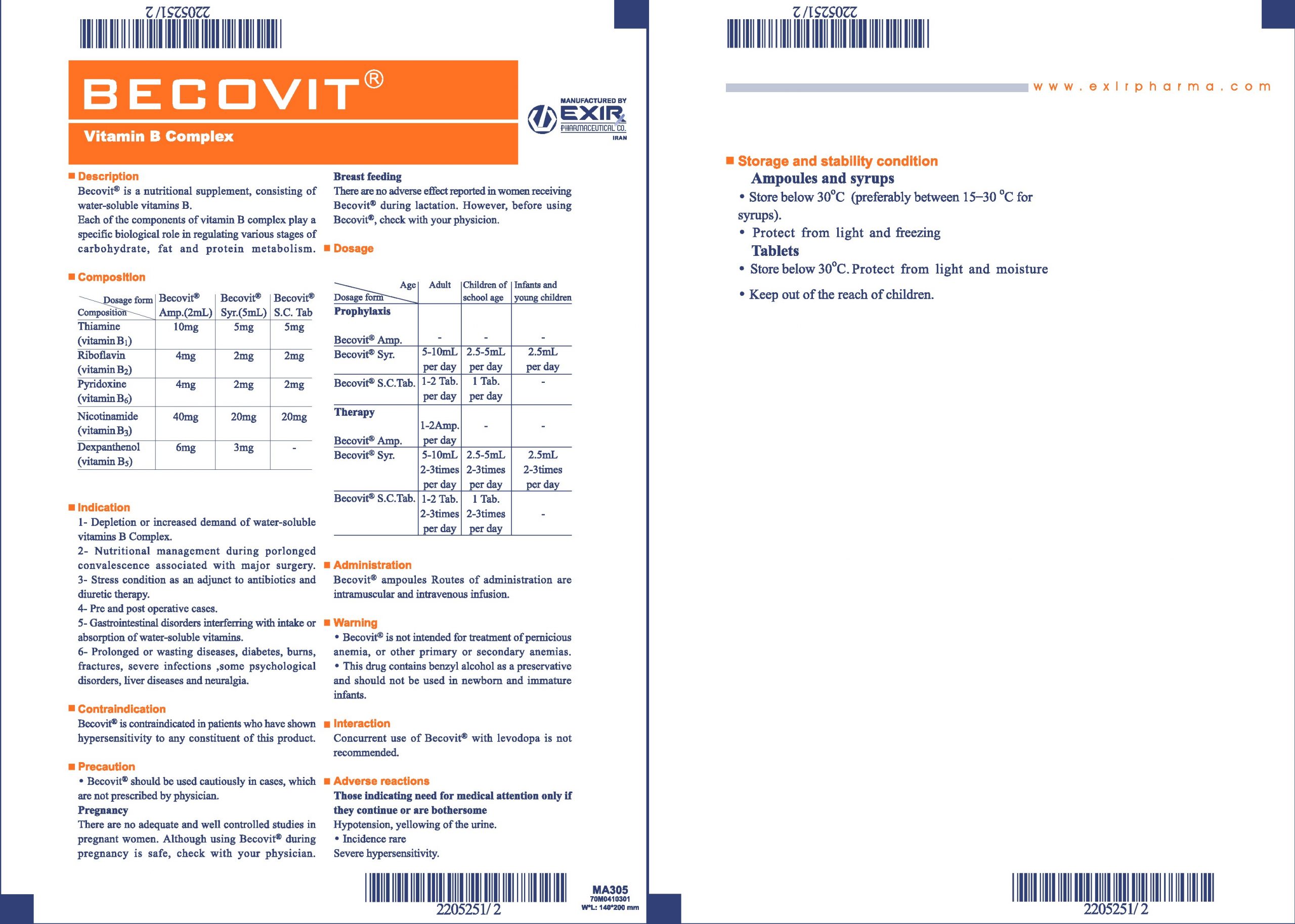BECOVIT
ampoule Vitamin B Complex ( 2ml )

| Generic Name of Product | Brand Name | Dosage Form | Strength | Pharmacologic Group | Therapeutic Group | Unit Per Pack |
| Vitamin B Complex | Becovit® | Ampoule | 2ml | Vitamin, Water soluble | Vitamins | 10 |
Indications And Usage | In disorders requiring parenteral administration of vitamins, i.e. pre- and post-operative treatment, when requirements are increased as in fever, severe burns, increased metabolism, pregnancy, gastrointestinal disorders interfering with intake or absorption of vitamins, prolonged or wasting diseases, alcoholism and where other deficiencies exist. |
Administration | Usually 0.25 to 2 mL by intramuscular or slow intravenous injection. High concentrations given intravenously may be diluted using parenteral infusion solutions. Parenteral drug products should be inspected visually for particulate matter and discoloration prior to administration, whenever the solution and container permit |
Contraindications | Hypersensitivity to folic acid, cyanocobalamin, pyridoxine, or any component of the formulation |
Precautions | The usual precautions for parenteral administration should be observed. Do not inject if precipitation occurs. Inject slowly by the intravenous route. High concentrations should be diluted using Normal Saline Injection when given intravenously. |
Adverse Reactions | Mild transient diarrhea, polycythemia vera, peripheral vascular thrombosis, itching transitory exanthema, feeling of swelling of entire body, anaphylactic shock and death. Sensitivity to the ingredients listed may occur. Use should be discontinued upon observance of any untoward reaction. Pain upon intramuscular injection may be noted. |
Pregnancy and lactation | Your dose needs may be different during pregnancy. Some vitamins and minerals can harm an unborn baby if taken in large doses. You may need to use a prenatal vitamin specially formulated for pregnant women. |
Renal and liver Impairment | - |
Laboratory Tests | - |
Indications And Usage | In disorders requiring parenteral administration of vitamins, i.e. pre- and post-operative treatment, when requirements are increased as in fever, severe burns, increased metabolism, pregnancy, gastrointestinal disorders interfering with intake or absorption of vitamins, prolonged or wasting diseases, alcoholism and where other deficiencies exist. |
Administration | Usually 0.25 to 2 mL by intramuscular or slow intravenous injection. High concentrations given intravenously may be diluted using parenteral infusion solutions. Parenteral drug products should be inspected visually for particulate matter and discoloration prior to administration, whenever the solution and container permit |
Contraindications | Hypersensitivity to folic acid, cyanocobalamin, pyridoxine, or any component of the formulation |
Precautions | The usual precautions for parenteral administration should be observed. Do not inject if precipitation occurs. Inject slowly by the intravenous route. High concentrations should be diluted using Normal Saline Injection when given intravenously. |
Adverse Reactions | Mild transient diarrhea, polycythemia vera, peripheral vascular thrombosis, itching transitory exanthema, feeling of swelling of entire body, anaphylactic shock and death. Sensitivity to the ingredients listed may occur. Use should be discontinued upon observance of any untoward reaction. Pain upon intramuscular injection may be noted. |
Pregnancy and lactation | Your dose needs may be different during pregnancy. Some vitamins and minerals can harm an unborn baby if taken in large doses. You may need to use a prenatal vitamin specially formulated for pregnant women. |
Renal and liver Impairment | - |
Laboratory Tests | - |
Indications And Usage | In disorders requiring parenteral administration of vitamins, i.e. pre- and post-operative treatment, when requirements are increased as in fever, severe burns, increased metabolism, pregnancy, gastrointestinal disorders interfering with intake or absorption of vitamins, prolonged or wasting diseases, alcoholism and where other deficiencies exist. |
Administration | Usually 0.25 to 2 mL by intramuscular or slow intravenous injection. High concentrations given intravenously may be diluted using parenteral infusion solutions. Parenteral drug products should be inspected visually for particulate matter and discoloration prior to administration, whenever the solution and container permit |
Contraindications | Hypersensitivity to folic acid, cyanocobalamin, pyridoxine, or any component of the formulation |
Precautions | The usual precautions for parenteral administration should be observed. Do not inject if precipitation occurs. Inject slowly by the intravenous route. High concentrations should be diluted using Normal Saline Injection when given intravenously. |
Adverse Reactions | Mild transient diarrhea, polycythemia vera, peripheral vascular thrombosis, itching transitory exanthema, feeling of swelling of entire body, anaphylactic shock and death. Sensitivity to the ingredients listed may occur. Use should be discontinued upon observance of any untoward reaction. Pain upon intramuscular injection may be noted. |
Pregnancy and lactation | Your dose needs may be different during pregnancy. Some vitamins and minerals can harm an unborn baby if taken in large doses. You may need to use a prenatal vitamin specially formulated for pregnant women. |
Renal and liver Impairment | - |
Laboratory Tests | - |

